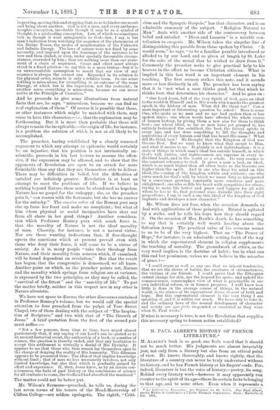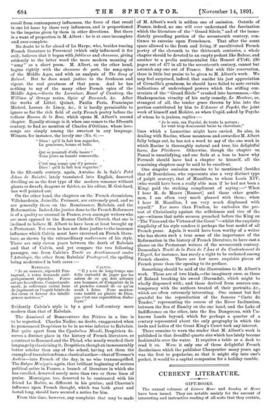M. PAUL ALBERT'S HISTORY OF FRENCH LITERATURE.* M. ALBERT'S book
is so good, one feels vexed that it should not be much better. His judgments are almost invariably just, not only from a literary but also from an ethical point of view. He knows thoroughly, and knows rightly, that the literature of a country can never be truly understood without its history, and he has French history at his fingers'-ends. For, indeed, literature is but the voice of history,—poetry, its song. Behind every literary work—however it may apparently run counter to the spirit of its age—there lie certain facts belonging to that age, and to none other. Even when it represents a
• La Littirature Francaise : des Origines as 18c Siècle. Par Paul Albert. ancien Maitre de Confirmees a rEcole Normale Superieure. Paris Hachette at Cie. 1891.
recoil from contemporary influences, the force of that recoil is one let loose by those very influences, and is proportioned to the impetus given by them in other directions. But there is a want of proportion in M. Albert : he is at once incomplete and over-complete.
No doubt he is far ahead of La Harpe, who, besides tracing French literature to Provençal (which only influenced it for evil), believes that it began with fabliaax and chansons, giving evidently to the latter word the more modern meaning of " song " as a short poem. M. Albert, on the other hand, begins rightly with the chansons de geste, the song-epics of the Middle Ages, and with an analysis of The Song of Roland. But he does scant justice to the freshness and
'vigour, the real greatness of that poem. And he has nothing to say of the many other French epics of the
Middle Ages,—Garin the Lorrainer, Raoul of Cambray, the William of Orange series, Ogier of Denmark, &c. After
the works of Littre, Quinet, Paulin Paris, Francisque Michrel, Leroux de Lincy, &c., it is hardly permissible to
ignore so far the rich field of early French poetry before the tedious Roman de la Rose, which opens M. Albert's second chapter. Equally strange is it, when one comes to the fifteenth century, to find no mention of Charles d'Orleans, whose love- songs are simply among the sweetest in any language.
Witness, for instance, the lovely one (No. 6):— "Dieu! qu'il la fait bon regarder, La gracieuse, bonne et belle.
Qui se pourrait d'elle lesser ? Tons jours sa beaute renouvelle.
C'est ung songe que d'y penser. Dieu! qu'il la fait bon regarder."
In the fifteenth century, again, Antoine de la Sale's Petit Jehan de Saintre, lately translated into English, deserved
dwelling on as the first type of the modern romance without giants or dwarfs, dragons or fairies, as his editor, M. G uichard, bas well pointed out.
On the other hand, the chapters on the French chroniclers, Villehardouin, Joinville, Froissart, are extremely good, and so are generally those on the Renaissance, Rabelais, and the Reformation. Indeed, the justice done to the French Reformers is of a quality so unusual in France, even amongst writers who are most opposed to the Roman Catholic Church, that one is inclined to believe M. Albert to have been at least brought up a Protestant. Yet even he has not done justice to the immense
influence which Calvin must have exercised on French litera- ture, as shown by the extraordinary modernness of his style. There are only eleven years between the death of Rabelais and that of Calvin, and yet compare the two following passages, one from Calvin's Traits ou Avertissement contre l'Astrologie, the other from Rabelais' Pantagruel, the spelling
being modernised in both cases :—
RABELAIS. CALVIN.
" Je ne saurais, repondit Pan- " y a en de long-temps une tagruel, a votre demande cats- folle curiosite de juger par les goriquement repondre. Force astres de ce qui doit advenir ostque le confesse. Conjecturale- aux hommes, et d'enquerir de la ment, je refererais cestui hour et prendre conseil de ce qu'on de jugement en l'esprit benevole avast a faire. Nous montre- des cieux et faveur des intelli- rons taut& au plaisir de Dieu,
genes motrices." que c'est une superstition diabo- lique."
Evidently Calvin's style is by a good half-century more modern than that of Rabelais.
The dismissal of Bonaventure des Periers in a line is
'to be regretted. Charles Nodier, no doubt, exaggerated when he pronounced Desperiers to be in no wise inferior to Rabelais. But quite apart from the Cymbalum Mundi, Desperiers de-
serves a distinct place in the history of French literature, as a contrast to Ronsard and the Pleiad, who nearly wrecked their
language by classieisin g it; Desperiers, though an immeasurably better scholar than any of the school, having set them the -example of translation from a classical author—that of Terence's Andria—into French of the day, in no wise transmogrified. The Satyre Menippge, again, that brilliant beginning of serious
political satire in France, a branch of literature in which she has excelled, deserved surely more than two or three lines of praise. Montaigne, too, deserved to be contrasted with his friend La Boetie, so different in his genius ; and Charron's influence upon French thought, which was both great and lasted long, should have secured a notice for him.
From this time, however, any complaint that may be made
of M. Albert's work is seldom one of omission. Outside of France, indeed, no one will ever understand the fascination which the literature of the " Grand Siecle," and of the imme- diately preceding portion of the seventeenth century, con- tinues to exercise upon Frenchmen. That after the scant space allowed to the fresh and living, if uncultivated French poetry of the eleventh to the thirteenth centuries, a whole chapter should be devoted to an empty pedant like Balzac, and another to a prolix sentimentalist like Honore d'Urfe, 230 pages out of 477 in all to the seventeenth century, cannot but astonish any one out of France. But with this reservation, there is little but praise to be given to M. Albert's work. We may feel surprised, indeed, that amidst his just appreciation of Corneille's greatness, he should have failed to note certain indications of undeveloped powers which the stifling con- straints of the " Grand Siecle " crushed into barrenness,—the Shakespearian vivacity of his early comedy, Le Menteur, or, strangest of all, the tender grace thrown by him into the portion contributed by him to L'Amour et Psyche, the joint work of himself and Moliere, as when Cupid, asked by Psyche of whom he is jealous, replies :—
" Jo le suis, ma Psyche, de touts la nature; Le vent trop doucement baise to chevelure,"
lines which a Lamartine might have envied. So also, in dealing with Racine, whose meanness and cowardice M. Albert fully brings out, he has not a word to say of the one work in which Racine is thoroughly natural and true, his delightful farce, Les Plaideurs. Otherwise, though the chapter on Pascal is unsatisfying, and one feels at a loss to know why Perrault should have had a chapter to himself, all the remaining chapters may be said to be excellent.
One singular omission remains to be mentioned (besides
that of Bourdaloue, who represents also a very distinct type of pulpit oratory), that of Massillon, to whom Louis XIV. (who would have been a really able man if he had not been a King) paid the striking compliment of saying :—" When I hear M. de Meaux [Bossuet] and those other gentle- men, I am often very much pleased with them ; when I hear M. Massillon, I am very much displeased with myself." Far more than Fenelon, he embodies the pro- test of Christianity against the selfishness and vice of the age—witness that noble sermon preached before the King on "The Vices and the Virtues of the Great "—whilst the exquisite simplicity of his style renders it perhaps the best model of all French prose. Again, it would have been worthy of a writer who has shown such a true sense of the importance of the Reformation in the history of French literature, to have cast a glance on the Protestant writers of the seventeenth century. Dumoulin's Traits de la Paix de me et du Contentment de l'Esprit, for instance, has surely a right to be reckoned among French classics. There are few more exquisite pieces of French prose than the opening to its preface.
Something should be said of the illustrations to M. Albert's work. These are of two kinds,—the imaginary ones, as those of Roland breaking his sword (Durandal), which might be wholly dispensed with; and those derived from sources con- temporary with the authors treated of, their portraits, &c., which are often extremely interesting. One cannot but feel grateful for the reproduction of the famous "Carte du Tendre," representing the course of the River Inclination, between the Sea of Enmity on the one hand, and the Lake of Indifference on the other, into the Sea Dangerous, with Un- known Lands beyond, which for perhaps a quarter of a century represented about the only geography in which the lords and ladies of the Great King's Court took any interest.
There remains to warn the reader that M. Albert's work is published in that dreadful quarto size which has lately become fashionable over the water. It requires a table or a desk to read it on. Were it only one of those delightful French duodecimos which the publisher Charpentier many years ago was the first to popularise, so that it might slip into one's pocket, it would be a capital companion for a holiday ramble.







































 Previous page
Previous page